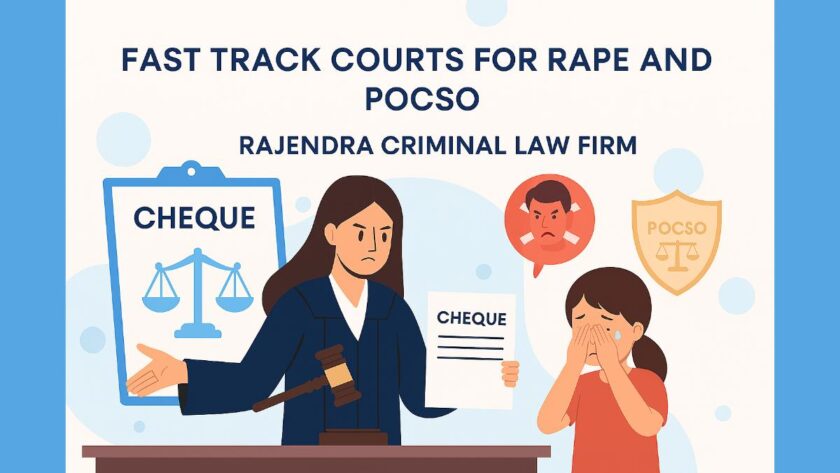Fast track courts are special courts established to handle sensitive and urgent criminal cases. They primarily focus on cases involving rape and offenses under the Protection of Children from Sexual Offences (POCSO) Act. The aim is to ensure speedy justice while protecting the rights of both the victim and the accused.
At Rajendra Criminal Law Firm, we have observed how fast track courts reduce the usual delay in criminal trials. By prioritizing sensitive cases, these courts help maintain public confidence in the justice system. They operate under the procedural safeguards of the Code of Criminal Procedure (CrPC) and adhere strictly to Indian Penal Code (IPC) provisions.
Fast Track Courts for Rape and POCSO: What the Accused and Victims Must Know: Rajendra Criminal Law Firm
Purpose of Fast Track Courts
The primary purpose of fast track courts is to expedite trial proceedings. In cases of rape or sexual assault, timely justice is critical. Delays can traumatize victims and undermine the legal process. Fast track courts also help the accused by ensuring that cases do not drag indefinitely, which can affect reputation and mental well-being.
These courts operate with designated judges and dedicated staff. They are often supported by special prosecutors and law enforcement officers trained in handling sexual offense cases. The structure ensures that hearings, evidence recording, and witness examination happen quickly and efficiently.
Legal Framework
Fast track courts function under multiple laws. The IPC governs the substantive offense of rape and related sexual crimes. Sections 375 and 376 define the crime of rape and prescribe punishment. The POCSO Act provides additional provisions for offenses against minors, including special reporting procedures and stricter penalties.
Criminal Procedure Code (CrPC) ensures that procedural rights of both parties are protected. It regulates the filing of First Information Reports (FIRs), bail applications, evidence submission, and trial procedures. Fast track courts follow these codes while compressing timelines to ensure swift justice.
Filing Cases in Fast Track Courts
Cases are usually initiated by filing an FIR at a police station. Once the FIR is lodged, police conduct a preliminary investigation. They collect evidence, record statements, and prepare a chargesheet. The chargesheet is then submitted to the fast track court, which begins the trial promptly.
In cases involving children, the POCSO Act mandates special procedures. Interviews of child victims must be recorded in a child-friendly environment. Medical examinations and evidence collection are conducted with sensitivity. Fast track courts adhere to these procedures to ensure compliance with the law.
Role of Law Enforcement
Police officers play a vital role in fast track cases. They must conduct investigation with professionalism and sensitivity. Timely collection of evidence, accurate documentation, and proper recording of statements are essential. Mistakes in investigation can weaken the prosecution or aid the defense in case of wrongful charges.
Law enforcement also coordinates with forensic labs, hospitals, and social workers. In POCSO cases, trained child protection officers are often involved. Their input ensures that evidence is legally admissible and that the rights of children are protected.
Rights of Victims
Victims have several rights under law. They are entitled to legal aid and counseling. The law ensures privacy and protection from intimidation or harassment. Fast track courts facilitate quick hearings to minimize trauma and ensure timely justice.
Medical and psychological support are integral to these cases. Victims can request compensation under the Victim Compensation Scheme. Witness protection and anonymity measures are also available to safeguard their identity.
Rights of the Accused
The accused also have constitutional and legal rights. They have the right to legal representation, to remain silent, and to be presumed innocent until proven guilty. Bail provisions under CrPC allow the accused to request release, subject to the severity of the offense and risk of flight or tampering with evidence.
Fast track courts ensure that the accused receives a fair trial. Despite the urgency of the proceedings, the court examines evidence carefully, hears witnesses, and follows due process. Lawyers play a crucial role in safeguarding these rights and preparing an effective defense strategy.
Evidence and Trial Procedures
Evidence is the cornerstone of fast track trials. Courts rely on forensic reports, medical certificates, witness statements, and material evidence. Recording of testimonies happens quickly, often with video or audio assistance. This reduces the chances of witnesses forgetting details or being intimidated.
Special provisions under POCSO allow recording child testimonies through video conferencing. Courts ensure that cross-examination is conducted respectfully and sensitively. Expert testimony, medical reports, and psychological assessments form part of the evidence.
Role of Legal Counsel
Legal representation is critical for both the accused and the victim. Experienced lawyers guide clients through complex procedures, prepare documentation, and strategize for hearings. They also advise on plea negotiations, bail applications, and appeal options.
At Rajendra Criminal Law Firm, our team handles cases with utmost professionalism. We protect the rights of the accused while ensuring compliance with procedural laws. Similarly, we assist victims in asserting their rights and receiving justice without unnecessary delays.
Speedy Justice and Its Importance
Fast track courts aim to reduce the pendency of sensitive cases. A quick resolution helps restore public confidence in the legal system. For victims, it minimizes psychological trauma. For the accused, it prevents prolonged uncertainty and social stigma.
Courts conduct daily hearings, streamline procedures, and prioritize urgent matters. This approach differs from regular courts, where cases may remain pending for years. By focusing on efficiency without compromising fairness, fast track courts fulfill their purpose effectively.
Challenges in Fast Track Courts
Despite their advantages, fast track courts face challenges. High case volumes can still cause delays. Lack of trained personnel, limited resources, and infrastructural constraints sometimes affect proceedings.
Another challenge is ensuring fair trial while expediting hearings. Courts must balance urgency with due process. Judges often need to manage multiple cases simultaneously, requiring careful scheduling and meticulous record-keeping.
Alternative Mechanisms and Support
In addition to legal proceedings, support mechanisms exist for victims. Counseling, rehabilitation, and compensation schemes complement the judicial process. NGOs and social workers often assist victims during investigation and trial.
For the accused, legal aid and representation ensure fair treatment. Proper advice can prevent procedural errors and safeguard constitutional rights. These mechanisms, combined with fast track procedures, create a comprehensive approach to justice.
Recent Legal Reforms
The Indian government has introduced several reforms to strengthen fast track courts. Amendments to CrPC and POCSO rules have emphasized speed, sensitivity, and accountability. Special prosecutors, dedicated staff, and infrastructural improvements have enhanced efficiency.
Digital evidence management, video recording of testimonies, and online case tracking further support speedy justice. Courts also adopt victim-friendly measures, ensuring safety, confidentiality, and emotional support.
Importance of Awareness
Both victims and accused must be aware of their rights and legal obligations. Understanding procedures, timelines, and evidence requirements reduces confusion and ensures compliance. Awareness also helps in accessing legal remedies effectively and avoiding unnecessary delays.
Legal education and professional guidance are critical in navigating these sensitive cases. Rajendra Criminal Law Firm provides clients with clear, practical advice and thorough representation.
Frequently Asked Questions
Fast track courts are special courts designed to expedite trials of sensitive cases like rape and POCSO offenses. They ensure timely justice, reduce trauma for victims, and prevent prolonged uncertainty for the accused. These courts follow CrPC procedures while prioritizing speed without compromising fairness.
Cases usually begin with the filing of a First Information Report (FIR) at the police station. The police investigate, collect evidence, and submit a chargesheet to the fast track court. For child victims under POCSO, procedures like child-friendly interviews and sensitive medical examinations are mandatory.
Victims have the right to legal aid, privacy, protection from intimidation, and speedy hearings. They can access counseling, medical support, and compensation under the Victim Compensation Scheme. Courts ensure that testimonies are recorded respectfully, often using video conferencing for children.
The accused has the right to legal representation, presumption of innocence, and fair trial. Bail applications can be filed according to CrPC provisions. Fast track courts examine evidence thoroughly and follow due process, ensuring that the accused’s rights are protected despite expedited procedures.
Fast track courts conduct daily hearings, prioritize urgent cases, and streamline procedures for evidence recording, witness testimony, and cross-examination. Special prosecutors, dedicated judges, and trained staff ensure efficiency. Both victims and accused benefit from timely resolution while procedural safeguards are maintained.
Conclusion
Fast track courts are vital for delivering timely justice in rape and POCSO cases. They protect the rights of victims while ensuring a fair trial for the accused. By expediting proceedings and adhering to legal procedures, these courts minimize trauma and social impact.
Awareness, proper representation, and procedural compliance are essential for both parties. At Rajendra Criminal Law Firm, we provide expert guidance and advocacy to navigate complex criminal cases. Our mission is to ensure justice, uphold the law, and protect the rights of all individuals involved. Fast track courts demonstrate that justice can be both swift and fair, reinforcing trust in India’s criminal justice system.
Read More
- How to Win a Criminal Trial in Sessions Court – Defence Tactics Revealed
- How to Get Police Protection Orders from Madras High Court
- Contempt of Court Cases in Madras High Court: Process & Punishments
- Anticipatory Bail in Tamil Nadu: Strategies That Work in Madras High Court
- Recent Criminal Appeals Allowed by the Madras High Court – 2025 Review
- Department of Justice – Fast Track Special Courts





